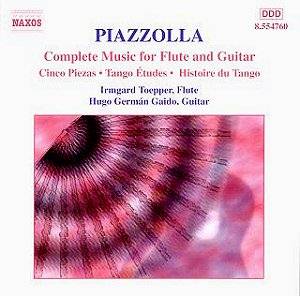Astor PIAZZOLLA
Complete Music for Flute and Guitar
 Irmgard Toepper (f)
Hugo German Gaido (g)
Irmgard Toepper (f)
Hugo German Gaido (g)
 NAXOS 8.554760
[67:04]
NAXOS 8.554760
[67:04]
Purchase from:
Crotchet
Amazon
USA

Like so many other 20th Century composers, once dismissed for
writing music people might enjoy (see also my review of Nino Rota's Chamber
Music) Piazzolla refused to follow fashion, basing as suited him, much
of his music around the tango. He was Argentinean, born in 1921and had a
diverse career ranging from jazz to cinema to the concert hall.
There are three works on this disc, each languid, light and lazily enchanting.
Cinco Piezas for guitar is, in this performance, a work lasting some
19 minutes and while the rhythmic elements of the tango buried deep within
any dance to this music would have to be very free. The Buenos Aires born
guitarist Hugo Germán Gaido has a fluently understated musicality,
and it is the subtle details such as his control over harmonics and stopped
notes that reveals his mastery.
One might presume that 25 minutes of Tango Études for flute
was stretching things, but the German flautist Irmgard Toepper captures the
attention with her very forthright and confident playing, and with her
atmospheric timbres. Perhaps inevitably, in their monophonic formality certain
passages call to mind Bach partitas. Yet other sequences, perhaps with equal
inevitability, summon images from Debussy.
The programme ends with the almost 22 minutes of Piazzolla's final word on
the subject: Histoire du Tango, for flute and guitar, four movements
charting the development of the form at 30 year intervals. The interplay
between the two instruments, which is often sprightly and joyous, does make
this the most accessible and interesting of the three works. Just try the
infectious opening movement 'Bordel 1900', which develops into a memorable
theme which you may find naggingly familiar yet frustratingly be unable to
place. However, once again those hoping for anything in vaguely danceable
tango form had better be very supple indeed. The more reflective and pastoral
moments, especially the melancholy guitar passages remind me, of all things,
of the one-time rock guitarist Anthony Phillips, who left Genesis after the
band's second album (Trespass) in 1970, and who went on to make a
series of mainly acoustic albums under the over all title of Private Parts
and Pieces. Just listen to Café 1930 [4:15 - 4: 42], and
if you are of a certain age and once fell victim to progressiverockfandom
completedisographyitis you may recall that Philips made an album of duets
- Private Parts And Pieces Part III: Antiques with Argentinean guitarist
Enrique Berro Garcia. Yet the similarity extends to Philips overall style.
The barriers between musical genres are not as firm as once they were, such
that these attractive works may not properly come under classical music at
all. Some might find it on the edge of jazz, or folk, or even New Age. Given
that the music has mutated from the tango's origins as an erotic dance in
the brothels of Argentina a century ago, it might easily set the mood to
many a romantic night. So yes, you may call it background music if you will,
but it really must be something as obvious as the climate, because come the
hot humid nights of early May this album suddenly came alive. When it is
simply too hot and humid for bold European musical drama - music born of
a cold climate - this proved ideal. Wait for a sultry summer night. Slip
this in the CD player and catch the breeze.
Reviewer
Gary S. Dalkin

